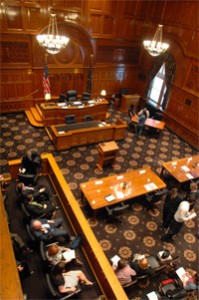Rant on the Economy
The collapse of the economy is the result of many different causes. There is plenty of blame to go around. For all too long, the government, under the spell of the mantra that “the government is the problem, the free market is the solution,” let much of the financial industry escape any real regulation by morphing into new forms of business that did not fall within the conventional regulatory schemes. As the Madoff and Stanford scandals show, the regulators gradually deregulated, through lack of vigorous enforcement, even in areas that are within their authority to regulate. As Judge Posner admitted recently, in that environment of rampant non-regulation, the Wall Street “Masters of the Universe” acted as he would expect, as “rational profit maximizers”: Unrestrained short term greed simply drove all good sense out of the market.
For example, most of the “credit default swaps,” and it appears much of the world of “derivatives,” is in fact gambling. Neither party to the swap has any connection to any actual economic activity. They are simply betting on the outcome of the actual economic activity undertaken by others. In a world of rational regulation, no honest business would propose such a scheme because regulators would be expected to swoop in and determine these swaps to be what they are — unenforceable gambling contracts. Where was the accountability for those in the financial industry, the regulators and those in charge of the regulators who all acted so irresponsibly? A new structure of regulation and new regulators need to be put in place so that those with basic good sense have the reinforcement of prudent regulation.
Some of the blame seems wrongheaded.

 Kudos (on getting this far) and best wishes (as we move forward) to the sixteen upper-level students who are competing this week in the quarterfinals of the
Kudos (on getting this far) and best wishes (as we move forward) to the sixteen upper-level students who are competing this week in the quarterfinals of the